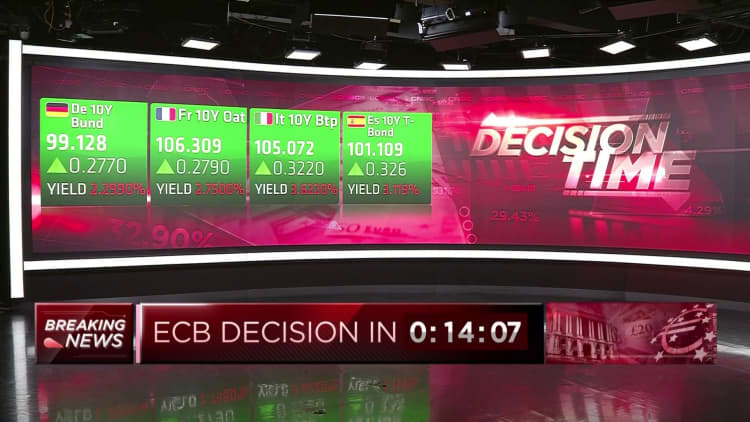

The European Central Bank cut its annual inflation forecast on Thursday, confirming consensus expectations of keeping interest rates unchanged.
Meanwhile, European Central Bank President Christine Lagarde said markets were pricing in a rate cut in June, consistent with policymakers’ outlook.
The staff forecast for inflation in 2024 was updated from 2.7% to an average of 2.3%. Looking ahead, staff expect inflation to reach the ECB’s 2% target in 2025 and cool further to 1.9% in 2026.
At the same time, they updated their 2024 economic growth forecast from 0.8% to 0.6% as economic activity in the euro zone emerges from the current stagnation. They then expected gross domestic product to grow 1.5% in 2025 and 1.6% in 2026, slightly weaker than their December forecast.
“We are in a deflationary process and we are making progress,” Lagarde told a news conference on Thursday.
“We’re more confident because of it, but we’re not confident enough yet, we need more evidence, more data, and we know that’s going to come in the next few months. We’ll know a little more in April, more in June .”
Policymakers have repeatedly pointed to May as a key date because wage settlements are due that month.
Lagarde said the ECB would “focus” on two areas of inflation that could surprise: wage growth and profit margins. The outlook could also surprise to the downside if monetary policy dampens demand more than expected or if global economic conditions worsen unexpectedly, she added.

Expect “convergence”
The announcement increased bets on a rate cut this summer.
The market has already expected Recent weeks have turned to June cuts. After ten rate hikes, the ECB’s key interest rate is now 4%, up from -0.5% in June 2022.
Lagarde said on Thursday that market pricing “seems more consistent with the ECB’s own view”. Earlier this year, policymakers staunchly resisted market bets on a rate cut in March or April.
Lagarde also said on Thursday that the ECB does not need to wait until overall inflation reaches its 2% target before making a decision.
Eurozone inflation fell to 2.6% in February from 2.8% in January. However, the core figure, which excludes energy, food, alcohol and tobacco, proved stickier at 3.1%.
“Relatively dovish”
Antonio Serpico, senior portfolio manager at Neuberger Berman, said the most likely scenario would be a 25 basis point rate cut per meeting starting in June, for a total of 150 basis points or more.
“The numbers are actually quite reassuring, we didn’t expect any cuts today,” he told CNBC’s Silvia Amaro.
“Today’s decision looks relatively dovish” given the downward revisions to both growth and inflation forecasts, he said.
“This means that the ECB Governing Council sees slower and lower economic growth than previously seen… and the new forecast is certainly weaker than the old forecast in terms of both headline and core inflation.”
The main variable will be the stickiness of core inflation driven by a tight job market, he added.
Core inflation forecasts were updated from 2.7% to 2.6% in 2024 and from 2.3% to 2.1% in 2025.







